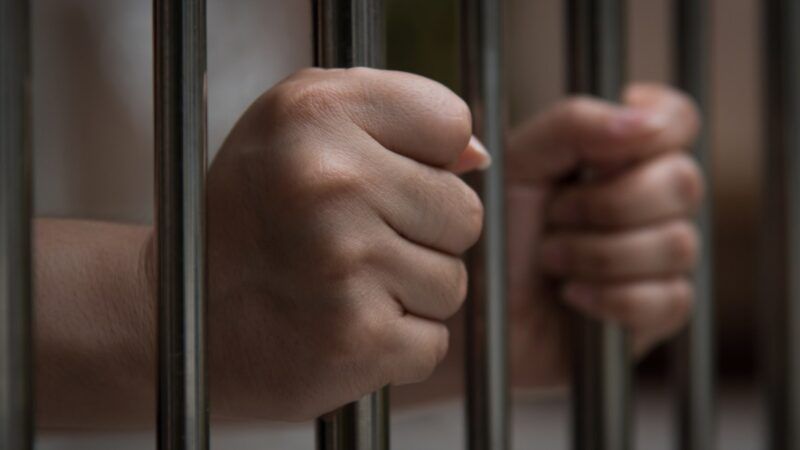Thousands of Federal Prisoners Aren't Getting Mandated Time Credits Because Prison Officials Won't Negotiate
COVID-19 has led to foot dragging in implementing some FIRST STEP Act reforms.

A new Department of Justice report released this week describes how some components of the criminal justice reform bill passed under President Donald Trump have not been implemented due to labor union negotiation delays. As a result, thousands of federal inmates are not yet seeing the sentence reductions promised under the bill.
The passage of the FIRST STEP Act was one of the big successes of Trump's administration. The federal criminal justice reform bill helped prisoners by retroactively applying changes in sentencing to crack cocaine sentences to more closely match the lower sentences for powder cocaine. It also gave federal judges more authority to deviate from mandatory minimum sentences for nonviolent drug offenders. Last year, the effects of the FIRST STEP Act benefited an estimated 7,000 people, either by releasing them from prison earlier or by reducing their sentences.
But not every federal inmate who qualifies for the benefits of the FIRST STEP Act is receiving them. On Tuesday, the Department of Justice's Office of the Inspector General (OIG) released a memorandum detailing how problems with labor negotiations between the Bureau of Prisons (BOP) and the BOP's national union have delayed full implementation of other parts of the FIRST STEP Act.
Changes in prison policies have to be negotiated through collective bargaining with the unions, regardless of what a federal law like the FIRST STEP Act may order, as mandated by the Civil Service Reform Act of 1978. According to the OIG report, labor negotiations haven't been happening. There have been no policy change negotiations for the past 20 months. The issue is that the BOP has demanded that negotiations happen remotely due to COVID-19, but the union is insistent on in-person negotiations as their contract stipulates.
Inspector General Michael E. Horowitz dings the BOP for the logjam here, noting that federal COVID-19 guidelines do allow for essential official travel, and most prison employees have been working in person throughout the pandemic because of the line of work.
The end result is that, three years after the FIRST STEP Act passed, several of its lesser-known policy changes are stuck in limbo. Among those are new ways for inmates to earn time credits for participating in productive activities like programs designed to reduce recidivism. There is no real parole system for inmates in federal prison if they were convicted after 1987, thanks to the Sentencing Reform Act of 1984 (co-sponsored by then-Sen. Joe Biden). Therefore, being able to earn time credits is particularly important to inmates trying to reduce their sentences.
According to the OIG report, there are 60,000 federal inmates who would be eligible for time credits under this new program but aren't earning them because it has not yet implemented. In a report to Congress last year, the attorney general's office noted the failure to implement these credits but argued that the effect was minimal because Congress had authorized the release back into the community of thousands of nonviolent inmates as part of an emergency COVID-19 bill to try to stop the spread of the disease in prisons.
But the OIG review found otherwise:
In our review of minimum and low risk inmates in BOP facilities in March 2021 alone, we identified 50 such inmates who do not appear to have benefited from their participation in [FIRST STEP Act] programming. These 50 inmates had earned, on average, 31 days of time credits and were all projected to be released from BOP custody within the following 6 months. Yet, as of March 27, 2021, none of these inmates had been transferred to community placement.
The FIRST STEP Act also requires the BOP to incentivize inmates to participate in these time credit programs. Those incentives may include benefits like additional phone and visitation privileges and transfers to facilities closer to their homes. But those incentives also have not been implemented because the policies haven't been finalized due to the stalled negotiations.
In his response, BOP Director Michael Carvajal said that the refusal to meet face to face with unions is consistent with federal guidelines to prevent and mitigate COVID-19 infection. He says that he will not implement recommendations for in-person meetings with the prison union unless it's authorized by Centers for Disease Control and Prevention guidance, though he adds that these meetings may start happening again by December. He also notes that even though the agency might not have formal policies negotiated for a lot of the FIRST STEP Act reforms, it has nevertheless implemented many changes informally via memos and guidance.
But even Carvajal acknowledges that the time credits were not being applied to inmates, though he says that information is now being tracked. That's not entirely helpful if they're not being applied, which the OIG notes in its response back to Carvajal.
The entire conflict is essentially a horrible example of how the federal government has been using COVID-19 as an excuse for institutional failures. The OIG memo notes that several other recommendations from past reviews remain unresolved, some going back years before the pandemic. In this case, people may actually end up serving longer prison sentences than they should just because a bunch of federal employees can't agree on how to take meetings.


Show Comments (9)